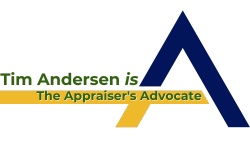Podcast: Play in new window | Download (Duration: 8:20 — 11.4MB)
Scope of work!? Doesn’t the boilerplate on the reporting form cover that? In truth, yes it does. But that may be its biggest problem. USPAP says your scope must be property and assignment specific. So, how can boilerplate be property specific? It can’t. See, that’s the problem. Boilerplate can’t know what you did or did not do. So, you customize your scope of work. You tell your client, in the report, how you came to a credible value conclusion. To do that, you design the scope of work, from scratch, to fit the assignment. Then you execute that design. Finally, you summarize all those in the report.
Scope of work is your effort! Your client does not set it. Remember, your client’s AMC does not set it, either. Nor does the reporting form set it. You set it! That is entirely your job! An appraiser, by definition, is independent, impartial, and objective. Because of these, you set the scope of what you do and don’t do. It’s up to you to choose the scope of what you will and will not do. Those choices are part of your ethics as an appraiser. This is how we promote and maintain a high level of public trust. To promote and maintain that trust are the actions that give the public reason to trust us!
Who sets the reviewer’s scope of work? Its just as when you function as an appraiser. When you function as a reviewer, you set that scope! Whatever reporting form you choose to use does not, either! This means you choose whether to include a separate value conclusion. A mere reporting form does not choose that for you. A mere client does not choose that for you. When your client orders a review, you tell the client what you will and will not do. That review, and what you include or exclude, are entirely your choice. Please don’t default to the reporting form! If you do, you aren’t independent, impartial, or objective as a reviewer. Give the client, and the public, reason to trust your review.


